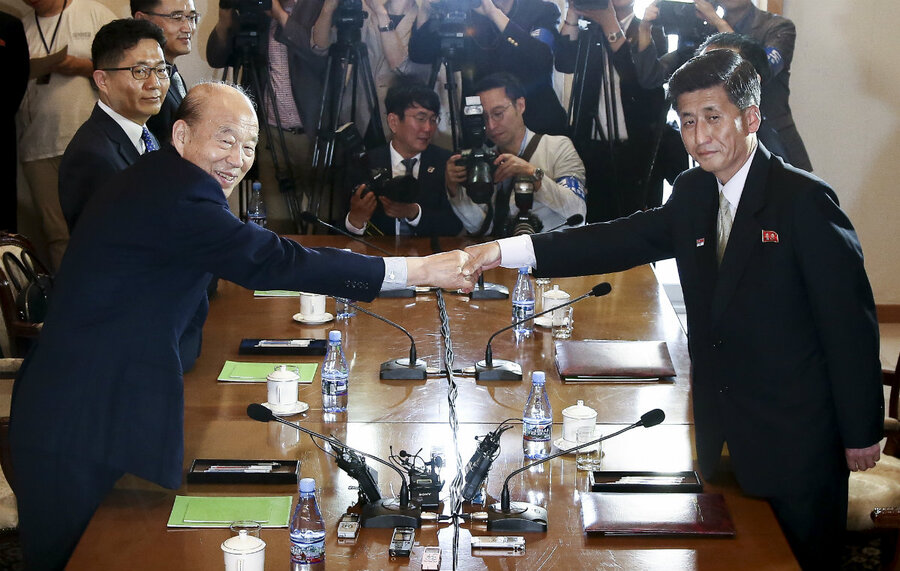North, South Korea to host reunions for war-split families
Loading...
| Seoul, South Korea
North and South Korea agreed Friday to hold temporary reunions of families divided by the 1950-53 Korean War as they boost reconciliation efforts amid a diplomatic push to resolve the North Korean nuclear crisis.
The reunions will take place at North Korea's Diamond Mountain resort from Aug. 20 to 26, Seoul's Unification Ministry said after a nine-hour meeting between Red Cross officials from the two sides.
It said the countries will each send 100 participants to the reunions. People with mobility problems will be allowed to bring a relative to help them.
Such temporary reunions are highly emotional as most wishing to take part are elderly people who are eager to see their loved ones before they die. The families have driven apart during the turmoil of the war.
North Korean leader Kim Jong-un and South Korean President Moon Jae-in agreed during a summit in April to hold the family reunions about Aug. 15, the anniversary of the Korean Peninsula's independence from Japanese colonial rule at the end of World War II in 1945.
Friday's talks between Red Cross officials at the Diamond Mountain resort were to arrange details of the reunions.
Mr. Kim and Mr. Moon met again in May. Their two summits have opened various channels of peace talks between the countries. The rivals recently agreed to restore cross-border military hotline communication channels and field joint teams in some events at the upcoming Asian Games in Indonesia.
"If we sternly separate ourselves from the unfortunate past and acquire a strong mindset for the new times, humanitarian cooperation between the North and South will flourish," North Korea delegate Pak Yong Il said at the start of the meeting. Mr. Pak, president of South Korea's Red Cross, expressed hope for talks that could "resolve the grief of our nation."
The Koreas last held family reunions in 2015 before relations worsened because of North Korea's accelerated pursuit of nuclear long-range missiles and the hard-line response of Seoul's then-conservative government.
Since the end of the Korean War, both Koreas have banned ordinary citizens from visiting relatives on the other side of the border or contacting them without permission. Nearly 20,000 Koreans have participated in 20 rounds of face-to-face temporary reunions held between the countries since 2000.
Aside from setting up a new round of reunions, South Korean officials also proposed a survey to confirm surviving members of war-separated families in North Korea and the possibility of hometown visits, but couldn't reach an agreement with North Korean officials, Pak told reporters after the meeting.
The limited numbers of reunions are vastly insufficient to meet the demands of aging relatives, who are mostly in their 80s and 90s, South Korean officials say. According to Seoul's Unification Ministry, more than 75,000 of the 132,000 South Koreans who have applied to attend a reunion have died. None of the past participants has had a second reunion.
South Korea uses a computerized lottery to pick participants for the reunions, while North Korea is believed to choose based on loyalty to its authoritarian leadership. South Korean analysts say North Korea allows only infrequent reunions for fear of wasting what it sees as an important diplomatic bargaining chip. North Korea may also worry that its citizens will become influenced by the much more affluent South, which could loosen the government's grip on power.
There had been expectations that Friday's meeting could get contentious if North Korean officials reiterated the country's demand for the return of 12 North Korean restaurant workers in return for allowing reunions.
Seoul has said the 12 women, who had worked in a restaurant in China, had defected and willingly settled in South Korea in 2016 but is now reviewing the circumstances following a media report suggesting at least some were brought against their will.
Pak was unwilling to provide a clear answer when asked whether North Korea had raised the issue during the meeting. The North rejected a South Korean proposal for family reunions last year, seeking the workers return first.
This story was reported by The Associated Press.







